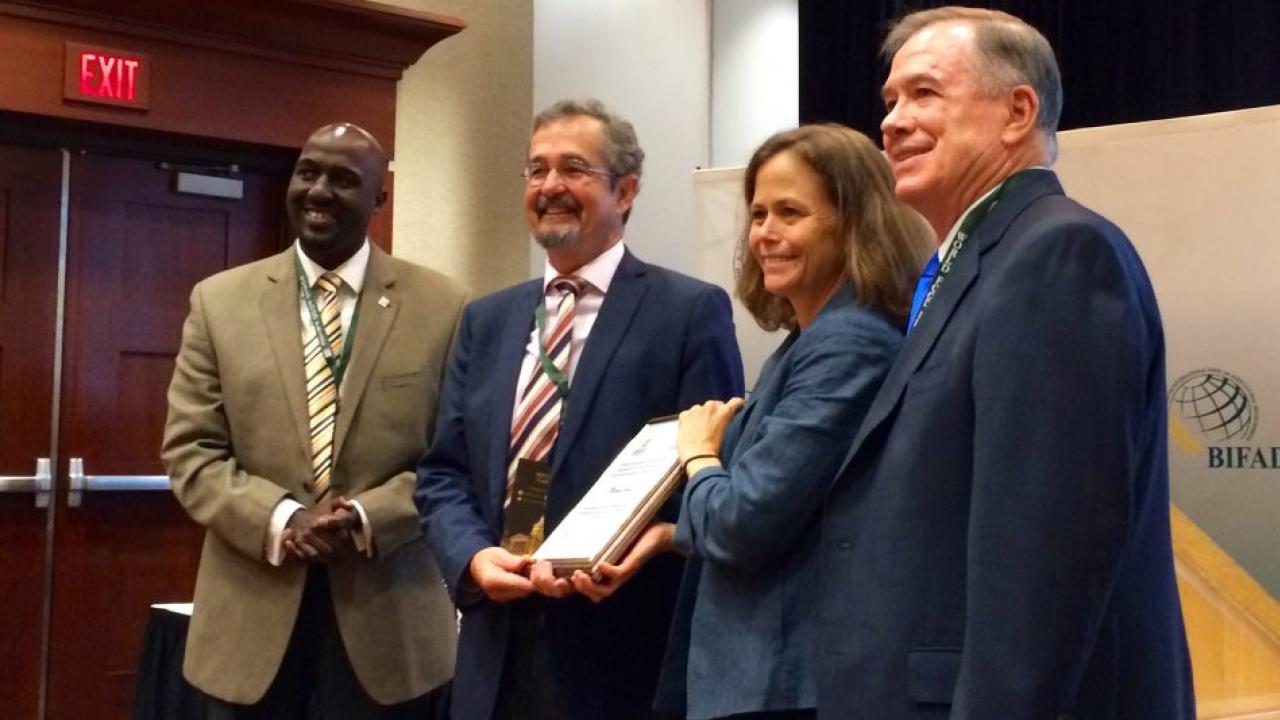
AMA Innovation Lab Team Wins BIFAD Award for Scientific Excellence in a Feed the Future Innovation Lab
We are pleased to announce that the AMA Innovation Lab is the proud recipient of the 2016 BIFAD Award for Scientific Excellence in a Feed the Future Innovation Lab. The purpose was to recognize individual researchers and/or a team of researchers for
- Demonstrated creativity in bringing about long-lasting, sustainable improvements in international food and agriculture
- Evidence of sustainable increases in food security and economic growth without degradation to the environment
- Success in communicating and disseminating the results to other peoples and places
This award was conferred on Michael Carter (University of California, Davis and Director of the AMA Innovation Lab), Christopher Barrett (Cornell University), and Andrew Mude (International Livestock Research Institute) by USAID’s advisory Board for International Food and Agricultural Development, and was presented today in Des Moines, Iowa, in conjunction with World Food Prize events. Please click here for the agenda of the BIFAD meeting where the award was conferred. For a live stream of the event, please click here.
They were nominated for this award due to their groundbreaking research on chronic poverty—its causes and solutions. This group of researchers not only changed the conversation about the nature of chronic poverty, but also pioneered solutions to solving this vexing problem.
The approach developed by this team is based on two important understandings. First, poverty dynamics and chronic poverty are best studied through the analysis of assets – the resources people use to produce a livelihood – rather than simply through analysis of income or other livelihood outcomes. Second, there may be a critical minimum asset threshold, below which individuals become mired in chronic poverty.
From a policy perspective, knowledge of the existence and location of such critical asset thresholds is vital. It can be used to identify those households where risk has its most deleterious consequences, and provides target for asset-building programs that aim to achieve sustainable poverty reduction.
The flagship project of this group has been the Index-based Livestock Insurance (IBLI) project in Northern Kenya and Southern Ethiopia. Not only did this group design, ground truth and implement a social safety net based on satellite images, they also maintained a sophisticated research program the demonstrated the impact of this program on food security and has continued to search for ways to improve the impacts and cost-effectiveness of the program. Building on the work of this group, the Government of Kenya recently launched the Hunger Safety Net Program (HNSP-2) and Kenya Livestock Insurance Program (KLIP) programs in an effort to redress chronic poverty in the arid and semi-arid reaches of that country.
At a separate event in Des Moines, Andrew Mude will be awarded the prestigious 2016 Norman Borlaug Award for Field Research and Application, which honors this same research on chronic poverty through the innovative use of satellite tech and community outreach to develop livestock insurance for vulnerable herding communities in Horn of Africa.
